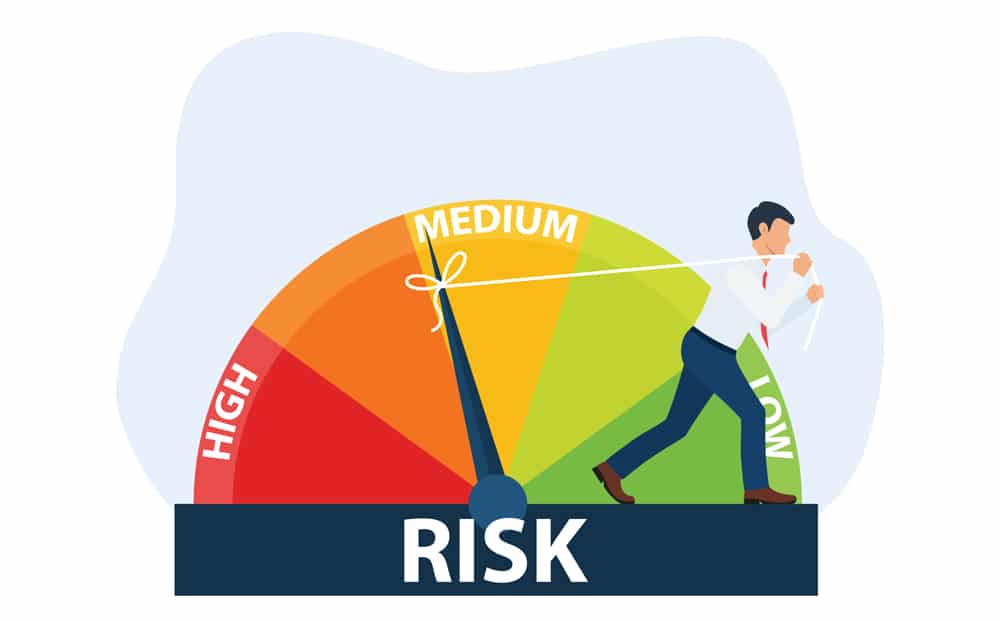
The Ins and Outs of Real Estate Risk Management
Risk…it’s everywhere – and it’s a defining factor behind so many rushed or poor decisions. That’s why for anyone looking to become a property investor, the conversation around real estate risk management has to come to light early on.
You see, if you’re new to property investing, then it’s possible you haven’t evaluated yet what your risk profile is, and how you plan to handle it. Essentially that is, how willing you are to expose yourself to loss, and how you will adapt when things go wrong.
Real estate risk management is essential to quashing those all-encompassing fears that can follow investing.
That’s not to say that it will put all those fears to bed at once – even seasoned property investors aren’t immune to fear – but it will help you to learn that having a real estate risk management strategy will alleviate a lot of the pressure and questions you’ll inevitably face in your 20-plus year investing journey.
WHAT IS REAL ESTATE RISK MANAGEMENT?
The reason so many people love investing in real estate is because it’s fairly low risk in general compared to other asset classes. For one, it has a long history of good performance in the market.
Like MoneySmart points out, it also has low volatility compared to other assets because it’s a physical investment – you can see and touch it.
However, there are still elements of risk, particularly financial risk, associated with owning real estate – and that only increases the more assets you buy.
Real estate risk management refers to the systems and safeguards you put in place that will help minimise any losses your investment properties might take on.
The first step here is to understand what is going to keep you up at night the most. Positive Real Estate’s Head Property Strategist Sam Saggers says that there are two things you need to be very honest with yourself about:
- How you deal with money loss; and
- What your risk profile is.
DEALING WITH MONEY LOSS
Figuring out a real estate risk management plan starts with defining whether you’re an investor who completely falls apart when they lose money, or an investor that views it as part of the bigger picture?
Here’s a possible scenario from Sam:
You’ve just purchased an investment property for $500k. However, within six months the value of that property has dropped to $450k due to impacts in the economy outside your control – like maybe a new variant of coronavirus coming back in full force…
How would you react to that?
There’s no wrong or right way to react because we’re all very different in the way we’re wired.
However, those who go on to become successful property investors know that to be sustainable in real estate, you have to have a realistic relationship with money – on your terms.
UNDERSTANDING YOUR RISK PROFILE
There are typically three different types of investors sitting on the real estate risk management scale: conservative, balanced and aggressive.
Your risk profile will likely fluctuate depending on other factors such as trends in the real estate market, your personal financial situation, or other prominent financial goals you have.
Conservative
These investors have a lower appetite for risk and as such are more likely to take a conservative approach and invest in low-risk options that are more protected from financial loss.
This could mean investing in real estate that is likely to maintain a steady value, but may not offer higher growth potential.
Balanced
These investors have a more moderate appetite for risk and are likely to invest in real estate that will steadily appreciate over a long time.
They may also have a balanced strategy if they have multiple properties that balance each other out i.e. a few high growth properties which are offset by more stable, income-producing properties.
Aggressive
These investors have a high appetite for risk and are generally focused on achieving maximum returns from their investment. They are typically interested in growing a profit at a faster rate, focusing on high growth and value add strategies.
This would include people like property traders who typically develop or renovate real estate to build equity and then sell them at a much higher value. These investors would likely need different real estate risk management strategies in place.
HOW INVESTORS MAY DEAL WITH RISK IN REAL ESTATE
Millionacres outlines three main ways that property investors may choose to handle risk based on their risk profile:
Risk Avoidance
Investors avoid a clearly defined risk and therefore eliminate it. For example, avoiding unintentional drowning lawsuits by buying properties without pools.
Risk Control
Investors control a risk by having the proper precautions in place from the start, such as a sturdy fence and gate around the pool.
Risk Transfer
Transferring certain risks can also protect investors and is often used in real estate risk management strategies. In this scenario, taking out insurance that protects you as the landlord of a property against unintentional drowning lawsuits.
TYPES OF RISK
There are four main types of risk associated with real estate.
Financial Risk
Financial risk comes in a wide variety of forms; bankruptcy, divorce, death, job loss, debt…any number of things can impact your financial outlook.
Capital is vital to buying an investment property, so it’s important to minimise any risk in your ability to obtain it through lenders, employment and business ventures.
The best thing you can do in real estate risk management is have a smart cash flow plan in place combined with a strong investing strategy to offset any potential risk to your financial situation.
Liquidity Risk
Real estate is not a liquid asset – meaning you can’t just offload it as soon as you need to. Therefore, relying on the money from a sale of a property is not going to be a quick fix for financial trouble.
To offset this type of risk you would want to buy in tightly held capital city suburbs where demand is high but supply is low.
You want to be sure there are a good amount of properties turning over to ensure a liquid market. You don’t, for example, want to buy in a suburb that already has a huge oversupply of apartments if you’re planning on buying your own as an investment.
Interest Rate Risk
Generally having a loan is not a risk because you know beforehand what you can afford to take on. However, not being able to repay the interest on that loan if rates were to change IS a risk.
We know that interest rates go up and down – and although they’ve remained at a record low for the past couple of years, the Reserve Bank of Australia has indicated that borrowers remain wary of the coming rate rises.
Of course it’s possible to mitigate the risk of variable mortgage rates by having things like a cash buffer or an offset account attached to the loan. You could also lock in some fixed interest rates on your properties to help manage the risk.
Learn how to prepare for interest rate rises here.
Market risk
A lot of the time discussions in real estate risk management are centred around the market. There are a lot of economic factors that affect the market that are completely outside of your control as an investor, like policy decisions and interest rates.
The best thing you can do to reduce market risk is follow the principles of P.I.E: Population, infrastructure and employment. As you choose locations if you follow all three you’re putting yourself in a position to get the best rental growth in the future.
At a wider level, you can also look into supply and demand metrics, yield performance, and demographic trends to ensure you’re buying in a less volatile part of the marketplace. Maintain adequate buffers and insurance policies to offset a drop in yields and/or damages to your assets.
REAL ESTATE RISK MANAGEMENT STRATEGIES
- Buy different types of properties
Don’t just buy only homes or only units. Different property styles can help you maximise opportunity and thereby minimise risk.
If budget allows, a CBD-based apartment that you fully furnish for short-term letting could be a great way to keep cash-flow coming in. With a house and land package, you might need to move further away from the CBD but that kind of property may experience a lot more capital growth over time.
Just make sure you do your research on what the area demographic is searching for.
- Spread out your properties
Find A-grade properties in diverse locations rather than sticking to the same neighbourhood or even state!
The Five Cities Strategy is a great way to build a strong-performing portfolio. Not only does the compounding effect of having your assets in different marketplaces allow for growth, it also allows for diversification so that your portfolio isn’t just experiencing the impacts of one particular market.
- Find tenants who aren’t one paycheck away from broke
The best tenants need to have enough disposable income where they aren’t impacted by lack of wage growth in the economy and they’re happy to pay more for your property because it fits in with their ideal lifestyle.
Similarly, you want to make sure they’re in a stable industry where things like a global pandemic won’t impact their employment status.
Also look at the rent-to-income ratios of potential tenants. If the rent is going to cost more than 30% of their income then that becomes a red flag considering tenants are likely to have a lot of other expenses they need to pay for.
- Buy different price ranges of property
Basically if you do need to get your hands on some capital quickly, your odds of selling a less expensive property faster are better.
In addition, the number of potential buyers will be larger for less expensive properties than they will be for more expensive ones.
Take note though, this isn’t the same as buying cheap properties BECAUSE they’re cheap. They still need to fit certain criteria in order to be worthwhile investments.
IS REAL ESTATE A SAFE INVESTMENT?
Even though real estate risk management is crucial to smart investing, it doesn’t mean that real estate itself is unsafe. In fact, it’s a huge advantage!
If you have the right systems in place, you can enjoy increased cash flow, tax deductions, capital growth and solid returns.
Whether you need advice on how to combat the fears surrounding property investing, or you’re just looking for a way to get started on the journey, why not register for one of our free property investing seminars? Held regularly, these high value events will teach you how to approach real estate in a safe and risk-reducing way so that you can focus more on creating long lasting wealth.
Register now for the free property investor webinar
Investment Property Guide 2023
Recent Articles
Investment Property Financing – Comprehensive Guide 2023
You won’t get very far as an investor without the ability to secure credit. Understanding how to...
Ultimate Property Investment Strategy Guide 2023
Which Property Investment Strategies Will Make You Money? Building your property investment...
How to Build a Property Portfolio with $100k or Less
Starting your property investment journey can seem daunting. There’s lots to research and plenty...
How To Develop Good Financial Habits That Lead To Wealth!
Good financial habits are the basis to creating wealth. Building financial freedom is not something you learn overnight, it takes time and a foundation of solid habits that you perform day in and day out.
The 7 Plans Every Property Investor Must Know To Succeed
When it comes to property investing as the saying goes, if you don’t have a plan, then you could be planning to fail! While there are many factors we can’t control in the market, there are certain facets we can manage to give us the best possible chance of success. In this article we will help you understand the 7 plans every property investor must know.
The Truth On How Many Investment Properties You Need To Retire
Using real estate to create financial security for the future is a popular option for many Australians, however it can be tricky to know how many investment properties you need to retire to get the outcome you desire.
What Is The Best Type Of Property Investment?
When you strive to learn everything you can about investing in property, you increase your chances of creating generational wealth! The best type of property to invest in is dependent on a number of factors about the investor and their real estate strategy.
The Property Investment Basics That You Need To Know
Real estate has the potential to become your main vehicle for creating wealth, but only if you take the time to learn some crucial property investment basics to set you up for success as an investor.
Retirement Planning Tips For Property Investors
It’s the Australian dream – the clock ticks 65 (or earlier) and off you sail into the sunset of retirement to live out the rest of your years stress-free. Sadly, for some, this will remain nothing more than a dream with the drastic cost of living rising and no plan to cover the shortfall.












